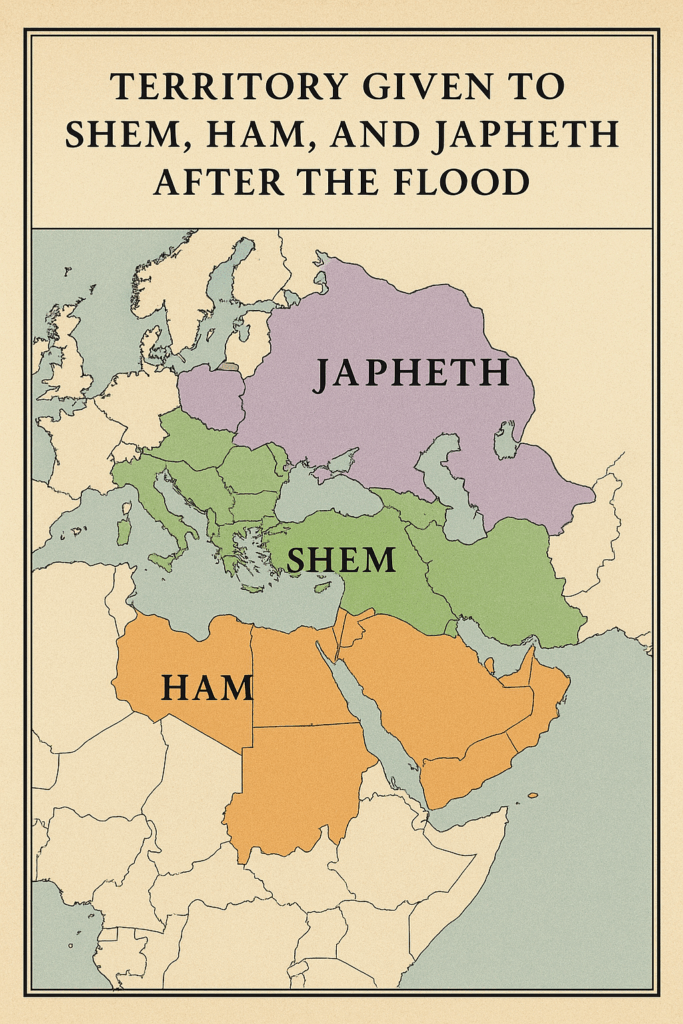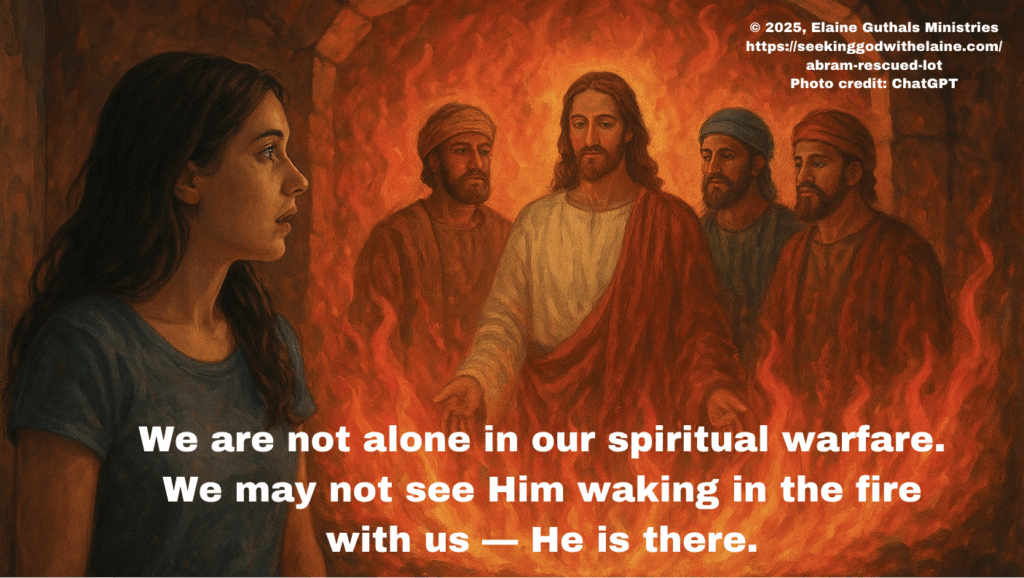The celebrating starts after the battle is won. This devotional reading looks at how Abram celebrated with two kings.
Nuggets
- The King of Sodom was a worldview king.
- Melchizedek was a king but also a High Priest – just like Jesus.
- We not only receive blessings from God, but we also bless Him.
- Abram’s disinterestedness and independence led to him not taking any of the recovered goods.

It’s time to celebrate the victory of Abram defeating the four kings. How does he do that?
Let's Put It into Context
To read devotions in the Creating Everything theme, click the button below.
Devotions in the Abraham the Emigrant series
Abram, the King of Sodom, and the King of Salem
“After Abram returned from his victory over Kedorlaomer and all his allies, the king of Sodom went out to meet him in the valley of Shaveh (that is, the King’s Valley). And Melchizedek, the king of Salem and a priest of God Most High, brought Abram some bread and wine” (Gen. 14: 17-18 NLT)
Abram met with two diverse kings after returning.
King of Sodom
The King of Sodom was a worldview king.
Hmmmm. Genesis 14: 17 is like a throwaway sentence.
How does it move Abram’s narrative forward? Well, it doesn’t – hence throwaway sentence. (We’ll have to wait a while to get the rest of the story.)
What can we gain from it by itself? Two things.
The New Living Translation sugarcoats the battle. It says victory. The Complete Jewish Bible says slaughter.
Our worshiper was a really good warrior.
The King of Sodom came to Abram, not the other way around. Sounds like Abram thought this was just a duty call.
The Valley of Shaveh may be the Kidron Valley, according to the Digital Bible. This is important because of its link to Jerusalem (ancient Salem). Then again, it may be the intersection of the Kidron Valley and the Valley of Hinnon.
Resource
Josephus, as reported by the Encyclopedia of The Bible, gave more insight to its location. He said it was the Valley of Hinnon, which was ¼ mile from Salem/Jerusalem
Resource
Anyway, it sounds like a meeting place of king.
That is fitting since Abram met the King of Sodom and the King of Salem, who was also a High Priest.
Here, it doesn’t sound like Abram gave the King of Sodom any great reverence. He did for the High Priest and King.
Yeah, probably ungodly verses godly had something to do with it.
King of Salem
Melchizedek was a king but also a High Priest – just like Jesus.
Wait! What????
“… and a priest of God Most High …” (Gen. 14: 18 NLT). Where did he come from?
Genesis 14: 18 details a visit from Melchizedek. Let’s look at these verses in the
Hebrew to make sure we aren’t missing something.
“And the Melech [king, angel] Sodom went out to meet him after his return from the defeat of Kedorlaomer, and of the. melachim [kings, angels] that were with him, at the Valley of Shaveh, which is the Valley of the King. And Malki-Tzedek Melech Shalem brought forth lechem [bread of life] and yayin [wine] and he was the kohen [High Priest] of El Elyon [God Most High]” (Gen. 14: 17-18 OJB).
The first thing I found interesting is that Melech is translated both king and angel. It reminds me of when we were studying the letters in Revelation. There was some debate as to whether the letters to the churches were to the angel or the Pastor Steve-type.
The other thing I found interesting is the bread of life and wine Melchizedek gave Abram.
Abram took a minute to worship God with Melchizedek.
This is probably the reason Melchizedek got a better reception from Abram than the King of Sodom did. Taylor thought so. He wrote,
“When Melchizedek came forth to meet him, Abraham did not treat him with coldness, because he happened at the moment to be in company with the King of Sodom. On the contrary, he showed him special honour, was not ashamed to receive his benediction, and gave him, without asking anyone’s leave, a tithe of the spoils. Now there was true courage!”
Resource
Digital Bible said this was important. This set the pattern for future blessings.
Resource
Also, for the first time, we learn about tithing. Abram gave Melchizedek a tenth of the spoils.
Jerdan thought Melchizedek was a descendant of Ham. No, I don’t see that. Why would the High Priest be a descendant of the cursed son?
Resource
I know. Sons are not their fathers, just as Ham wasn’t Noah. Melchizedek may have been more like Noah than he was like Ham.
But this is a High Priest – the very first mentioned in Scriptures. I don’t see him as a descendant of anyone but Shem.
Stafford said that some people think this is Shem himself, with Melchizedek being a title. Well, it could have been. He lived from 2411 to 1811 BC. (Remember, this somewhere between 1880 and 1875 BC.).
Resources
But the Stafford didn’t buy that. Why wouldn’t Moses call Shem Shem since he already had. He didn’t think Shem would be living in that area without previous conversations.
If Melchizedek was Shem, we would know his father and mother (though not her name). We know he died (Gen. 11: 11).
But Messiah came from Shem’s line. Plus, that was close to if not Shem’s territory.

Some say it was Jesus. Well, He is King and High Priest. Those are the elements of the Lord’s Supper. And bread of life???? Plus, titles of King of Righteousness and King of Peace?????????
There are some verses to back that up.
Resource
- “The LORD has taken an oath and will not break his vow: ‘You are a priest forever in the order of Melchizedek’” (Ps. 110: 4 NLT emphasis added).
- “Jesus has already gone in there for us. He has become our eternal High Priest in the order of Melchizedek” (Heb. 6: 20 NLT emphasis).
- “Accept their gifts, and make a crown from the silver and gold. Then put the crown on the head of Jeshuad son of Jehozadak, the high priest. Tell him, ‘This is what the LORD of Heaven’s Armies says: Here is the man called the Branch. He will branch out from where he is and build the Temple of the LORD. Yes, he will build the Temple of the LORD. Then he will receive royal honor and will rule as king from his throne. He will also serve as priest from his throne, and there will be perfect harmony between his two roles’” (Zech. 6: 11-13 NLT emphasis added).
- “This Melchizedek was king of the city of Salem and also a priest of God Most High. When Abraham was returning home after winning a great battle against the kings, Melchizedek met him and blessed him. Then Abraham took a tenth of all he had captured in battle and gave it to Melchizedek. The name Melchizedek means ‘king of justice,’ and king of Salem means ‘king of peace.’ There is no record of his father or mother or any of his ancestors—no beginning or end to his life. He remains a priest forever, resembling the Son of God” (Heb. 7: 1-3 NLT emphasis added).
I can go with the first two bullet points. I can see the third bullet at Jesus referred to Himself as the Temple.
I don’t know about the last bullet point. There are a lot of people in God’s Word that we aren’t given birth, death, or parents – not even lineage.
That is what it basically says in Hebrew. But it has a lot of capitalization, parentheses, and quotes that confused me.
I just have problems with Jesus being in human form before it was time to be Messiah. Did He come down and not sin? Or did He sin as Melchizedek?
Even if He was Melchizedek – if He sinned – wouldn’t that disqualify Jesus as Messiah?
The Congregational Pulpit thought Melchizedek was a foreshadowing of Christ. I can go with that. Joseph also was.
Was this Shem? Was this Jesus? Was this a model for Jesus?
Who knows for sure?
God does. We should put this in the UNR book — understanding not required.
What we do see here is Abram has communion with another saint.
Look at this. The priest came after the war was won. He didn’t come in condemnation. He came with food — whether it be a practical meal for physical refreshment or a spiritual foreshadowing of the Lord’s Supper.
Melchizedek Blesses Abram
“Melchizedek blessed Abram with this blessing: ‘Blessed be Abram by God Most High, Creator of heaven and earth. And blessed be God Most High, who has defeated your enemies for you.’ Then Abram gave Melchizedek a tenth of all the goods he had recovered” (Gen. 14: 19-20) NLT)
We not only receive blessings from God, but we also bless Him.
The job of the priest is to bless others. Melchizedek performed this task.
Melchizedek also knew that Abram was a blessing to God. We are to bless God with our faith, obedience, and worship.
We know, there were no Levitical priest at this time. Abram didn’t have a son, let alone a great grandson.
Leale argued Melchizedek was a more superior priest when put alongside the priesthood of Aaron. He said this was an evident in time, dignity, and duration.
Resource
Meyer agreed, saying this priesthood was instituted by God, not by human birth. It was a royal, eternal priesthood.
Resource
Abram saw Melchizedek someone to whom he was inferior. He acted in what he considered an appropriate way.
King of Sodom’s Reward for Abram
“The king of Sodom said to Abram, ‘Give back my people who were captured. But you may keep for yourself all the goods you have recovered.’ Abram replied to the king of Sodom, ‘I solemnly swear to the Lord, God Most High, Creator of heaven and earth, that I will not take so much as a single thread or sandal thong from what belongs to you. Otherwise you might say, ‘I am the one who made Abram rich.’ I will accept only what my young warriors have already eaten, and I request that you give a fair share of the goods to my allies — Aner, Eshcol, and Mamre’” (Gen. 14: 21-24 NLT)
Abram’s disinterestedness and independence led to him not taking any of the recovered goods.
Abram accomplished his goal of rescuing Lot. He didn’t care about the rest. It wasn’t his before. He had no desire for it after he gave the 10 percent to God.
Jerdan said that Abram had done his duty. He didn’t feel he should be paid for doing what was expected from him.
Resource
We also say Abram took none of the spoils from defeating Kedorlaomer and company from the King of Sodom. It seemed like he really didn’t want to have anything to do with him.
- “Walk with the wise and become wise; associate with fools and get in trouble” (Prov. 13: 20 NLT).
- “Don’t be fooled by those who say such things, for ‘bad company corrupts good character’” (I Cor. 15: 33 NLT).
Abram certainly didn’t want to gain from people who had lost because of war. But then was it the King of Sodom’s stuff get give away anyway?
But there is a part I don’t remember ever thinking about.
Bible Hub got me thinking about Abram as victor. In Abraham’s Actions, it said,
“Abraham conquers him in battle; so Canaan became the conqueror’s by conquest; he became the heir of Canaan. The history holds forth this mystery: that all Christians, the children of Abraham, are by their new birth born heirs of heaven, the celestial Canaan; they should therefore be valiant for it (Jeremiah 9:3).” (emphasis added)
Resource
Country A invades Country B. At least back then, Country B now belonged to Country A.
Elam, Babylonia, Ellasar, and Goiim invaded Sodom, Gomorrah, Adman, Zeboiim, and Zoar. Abram defeated Elam, Babylonia, Ellasar, and Goiim. Abram then owned Canaan.
Abram didn’t take the country, did he? Why? Wouldn’t that have legitimized the promise God gave Abram?
But then the land wouldn’t be a gift from God. It would have been something Abram earned. It would have been from man – specifically the Sodomites.
Some may say that Abram should have taken it. Maybe then Sodom and Gomorrah wouldn’t have been destroyed (Gen. 19).
If Abram would have demanded the land, then the covenant would have been broken.
It seems like Mamre, Eshcol and Aner did go with Abram (Gen. 14: 13). It wasn’t Abram’s decision if they should give up their fair share of the spoils.
Abram also accepted what his soldiers had used as rations. That is logical. They got your stuff back – this is their payment.
Making the Connections #1
There is a huge contrast between Kedorlaomer and Abram. Kedorlaomer probably did all his fighting with the motivation of greed, covetousness, and pride.
Abram on the other hand, went into this fight because of love. He loved his nephew, and he didn’t like to see how he and other innocent people were taken hostage.
So, Abram did something about it.
Making the Connections #2
We talked about, in the Genesis 14: 14-16 discussion, how God expects us to defend ourselves and our loved ones but also to submit to earthly authority.
Spurgeon talked about another kind of warfare that disciples are engaged in — spiritual warfare. This is inward and outward warfare.
There many be times in our own spiritual warfare that it looks like the odds were about those at which Abram was looking. One man with 318 fighting men plus however many Mamre, Eshcol and Aner brought along with them. They were fighting against four kings who were great sovereigns in their own rights and however many fighting men they had.
Abram had to go into this in faith. I like what Spurgeon said. He wrote, “Faith was Abram’s continual comfort.”
Resource
We are called to stand firm during spiritual warfare. Paul told us about the spiritual armor. We are to put it on.
Spurgeon pointed out Abram’s actions that we should emulate.
- Use discretion in choosing how and when to attack.
- Attack at the correct time.
- ·Keep going until victory is won.
One thing we don’t think about that Spurgeon brought up is seizing Jesus during the fighting. Think Shadrach, Meshach, and Abednego (Dan. 3: 16-28).
We are not alone in our spiritual warfare. We may not see Him waking in the fire with us — He is there.

Spurgeon made another interesting observation. Melchizedek may have shown up to refocus Abram to God. The victory must have brought with it a big rush.
It worked. Abram tithed.
Making the Connections #3
Fuller reminded me that Melchizedek could have been a descendant of Ham. Yes, he was the cursed son.
Resource
But God is about forgiveness. Melchizedek didn’t have the door shut on his faith because of his ancestor.
All can come to Christ. “There is no longer Jew or Gentile, slave or free, male and female. For you are all one in Christ Jesus” (Gal. 3: 28 NLT).
There are no barriers in coming to Christ.
How Do We Apply This?
- Don’t skip our worship of God just because there is an ungodly person in the room.
- Fight our foes.
- Use discretion in choosing how and when to attack.
- Attack at the correct time.
- Keep going until victory is won.
- Act in humility.
- Act in thankfulness.
- Be steadfast.
Resources
Prayer
What do you think?
Leave me a comment below (about this or anything else) or head over to my Facebook group for some interactive discussion.
If you don’t understand something and would like further clarification, please contact me.
If you have not signed up for the email providing the link to the devotions and the newsletter, do so below.
If God has used this devotion to speak with you, consider sharing it on social media.